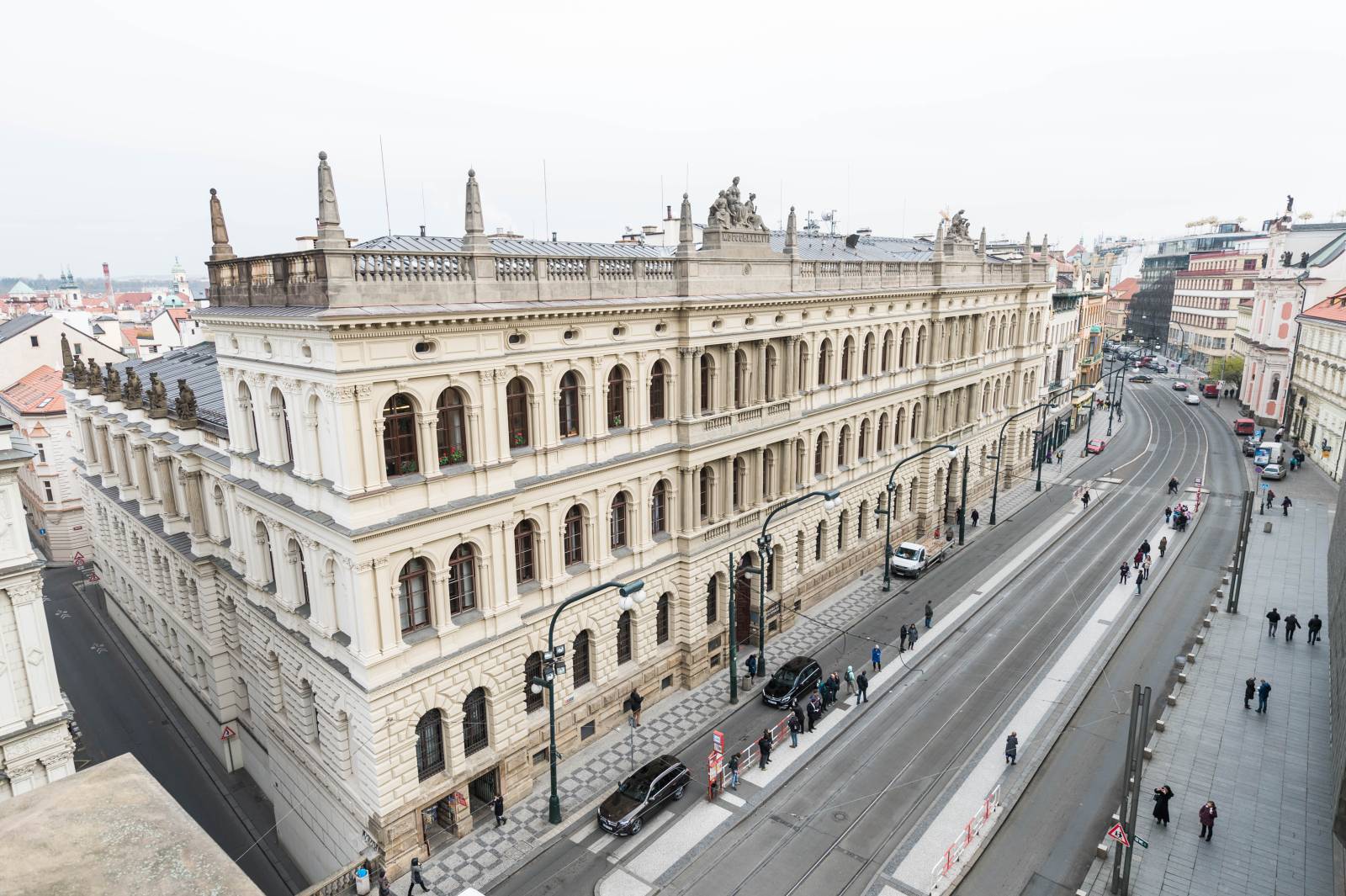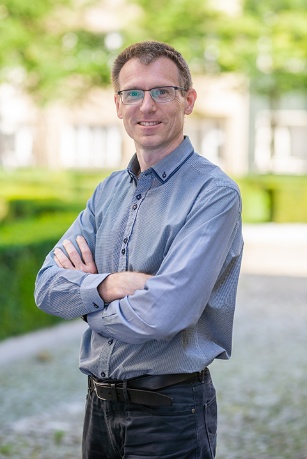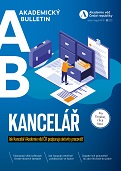
The CAS Head Office: Same river, different currents
03. 05. 2023
Career paths can sometimes be unpredictable. They may even lead you back to familiar places. Something similar happened to Leoš Horníček, whose professional life is tied with the Czech Academy of Sciences. He headed the Science Support Division of the CAS Head Office before serving as director of the CAS Head Office from 2011 to 2018. He returned to the same post at the beginning of 2023. What led him to step into the same river twice? In what direction does he plan to steer the CAS Head Office in the years to come? Find out in the interview of the March issue of our in-house e-magazine AB / Academic bulletin below.
What convinced you to step into the same river twice and lead the Head Office again?
I, too, long adhered to this principle of the Greek philosopher Heraclitus – you cannot step into the same river twice. However, the responsibility for the institution to which I have dedicated my life prevailed. So I accepted the unexpected challenge and offered my experience. I like challenges and the river in question is not the same, anyway. As I see it, its current seems to be getting faster and faster.
Do you still remember your beginnings?
Without you knowing it, your question actually goes back to the last century. The beginning of my career is linked to my alternative civilian service, which I served in the CAS Head Office from September 1999 to March 2001.
What brought you to the CAS as part of your civilian service?
I owe the opportunity to the director at the time, Jan Škoda. I was in charge of activities related mainly to the Science Support Division. A lot of data related to the activities of the Grant Agency of the CAS was processed as part of a database. We were preparing the second round of workplace evaluations, administering research plans and facility and equipment support, dealing with the transition from manual to digital questionnaire completion, and so on.
What else comes to mind from that time?
For example, the first experiences with the international activities of the CAS, specifically the General Assembly of the European Federation of Academies of Sciences and Humanities – ALLEA, which took place in Prague in 2000.
When did you become an employee of the CAS Head Office?
April 2001. In the Science Support Division, I worked successively as Computer Network and Information System Administrator, Head of the Programmes Section, and, from December 2006 until this January, Director of the Division itself.

Leoš Horníček, Director of the CAS Head Office.
How has the CAS Head Office changed during your more than two decades of service there?
I see significant changes in the organisation of work, in the structure, in the conducted activities, and in the staffing. Previously, we used to process many agendas in paper form, it was common to use typewriters, and the internet was in its infancy. Today, we can no longer imagine working without a computer, a printer, or an instant connection to the whole world. Everything has become more professional, and the staff has been diversified by younger generations.
You also experienced the crisis year of 2009, when there was speculation in the scientific community that the CAS Head Office would be abolished and the CAS institutes incorporated into the prospective Czech Ministry of Science and Research... How did you perceive this wild period in the life of the CAS?
I remember it mainly from the point of view of the Grant Agency of the CAS. I was in charge of its organisational support. The agency worked like a well-oiled machine. We were the first agency to introduce electronic submission of applications for funding support and annual reports on solutions or work with PDF documents, rules were adapted to early career researchers, parental leave was taken into account, and so on.
What made your work more difficult?
In 2008, the Czech government launched a national reform of the R&D system with a vision to concentrate departmental grant agencies – including ours – into two central ones. One focused on basic research, the Czech Science Foundation, and the other, which was to focus on applied research, the Technology Agency of the Czech Republic.
What were the issues associated with this?
Duplicate applications for funding support submitted to both the Grant Agency of the CAS and the Czech Science Foundation. By the way, at that time, both agencies were based at the CAS headquarters on Národní Street in Prague. The CAS leadership agreed in good faith to the changes, which promised to increase efficiency in the national context, and gave up providing earmarked funding through the Grant Agency of the CAS and other R&D programmes. In January 2015, our grant agency as the first agency established in the Czech Republic ceased operations, while some other departments did not give up their agencies – on the contrary, they started to establish new ones.
What did the end of earmarked funding support bring?
We shifted to providing institutional support through in-house competitions and grant programmes that focus on supporting excellence and important activities in research from the perspective of the CAS leadership. However, we retained the system of submitting applications, evaluating them, providing support, and controlling the use of funds.
Let’s go to the present day. Why do we need a Head Office? After all, the CAS institutes operate more or less independently of their “parent” institution.
The Head Office was established in 2001 as an internal organisational unit of the CAS. Its task is to fulfil legal obligations, mainly in connection with the laws pertaining to the CAS, regarding the property of the Czech Republic and budgetary rules. To simplify, we provide support to the governing bodies of the CAS – the Academy Assembly, the Academy Council, the Science Council, and their advisory and subsidiary committees.
How many employees work at the Head Office? Has the number changed over time?
For each year we have a set maximum number of employees – or full-time equivalents – and a set amount of funding for salaries and non-employment agreements. Unlike in the CAS institutes, it is not so easy to create a new position quickly – even if the situation requires it. We either have to abolish another position or ask the Ministry of Finance to increase the posts. For 2023, we have a limit of 72 posts, which is almost permanently occupied. However, we also experience staff turnover. Several of our employees are on parental leave. We try to accommodate those returning in terms of the amount of time they have available to work, so that they can combine it with childcare.
Do you have to adapt the running of the Office to the incoming President of the CAS?
By law, the CAS President acts in all matters that concern the Academy. They bear the unenviable responsibility for the institution as a whole. They must therefore delegate many of their responsibilities to colleagues. Each top official undoubtedly has a distinctive way of working and requires a slightly different approach and service, which we try to accommodate.
How specifically?
The President is appointed for a four-year term and can only hold the position for a maximum of two consecutive terms. The President’s term of office coincides with the mandate of the Academy Council and the Science Council, which are also elected by the Academy Assembly for four-year terms. Thus, every four years at the end of March, there is a change of personnel on the leadership level of the Academy. Initially, over a period of time, agendas are handed over, new members are assigned offices, secretariats, equipment, training...
What are your priorities in developing the activities of the Head Office?
Last year, we introduced institutional resilience mechanisms, trained the directors of the CAS institutes, and started interacting with the institutes. For better coordination, we want to create a manager position to be in charge of this agenda. Its importance is growing and will probably be anchored in the new law on R&D support.
Do you foresee any other key agenda?
Similarly, I would like to establish the position of cybersecurity coordinator. The risks associated with securing information systems or scientific data and outputs are increasing. In addition, the Cybersecurity Act is due to come into effect next year, which will impose new obligations on the Head Office and the CAS institutes.
The entire interview can be read in the March 2023 issue of the AB / Academic bulletin.
Ing. Leoš Horníček, Ph.D.
Director of the CAS Head Office
After graduating from the Faculty of Civil Engineering of the Czech Technical University in Prague, Horníček joined the CAS Head Office in 2001, where he held various positions. He served as Director in 2011–2018, Deputy Director in 2019–2022, and took over again as Director in 2023. He is a member of the Supervisory Board of the Technology Agency of the Czech Republic and represents the CAS in other ministerial boards as well. He has been professionally involved mainly in the administration of grant programmes, evaluation of research activities, and development of related information systems.
The March 2023 issue of the in-house e-magazine AB / Academic bulletin can be read (in Czech) below. The main story is available in English:

03/2023 (version for browsing)
03/2023 (version for download)
Prepared by: Zuzana Dupalová, Luděk Svoboda, Division of External Relations, CAO of the CAS
Photo: Pavlína Jáchimová, Jana Plavec, Division of External Relations, CAO of the CAS
 The text and photos are released for use under the Creative Commons licence.
The text and photos are released for use under the Creative Commons licence.
Read also
- A trapped state: The pandemic impact on public attitudes, trust, and behavior
- Aerial archaeology: Tracing the footsteps of our ancestors from the sky
- Archaeologists uncover ancient finds along Prague Ring Road
- Our microbiome largely depends on what we eat, says microbiologist Michal Kraus
- The ABCs of writing: Why did its invention mark a turning point for humankind?
- We learn, remember, forget… What can memory actually do? And can we outsmart it?
- New Center for Electron Microscopy in Brno opens its doors to global science
- The hidden lives of waste: What can we learn from waste workers and pickers?
- A unique lab is hidden right beneath Prague’s Vítkov Hill
- Renewables are a strategic investment in European security, scientists say
The Czech Academy of Sciences (the CAS)
The mission of the CAS
The primary mission of the CAS is to conduct research in a broad spectrum of natural, technical and social sciences as well as humanities. This research aims to advance progress of scientific knowledge at the international level, considering, however, the specific needs of the Czech society and the national culture.
President of the CAS
Prof. Eva Zažímalová has started her second term of office in May 2021. She is a respected scientist, and a Professor of Plant Anatomy and Physiology.
She is also a part of GCSA of the EU.